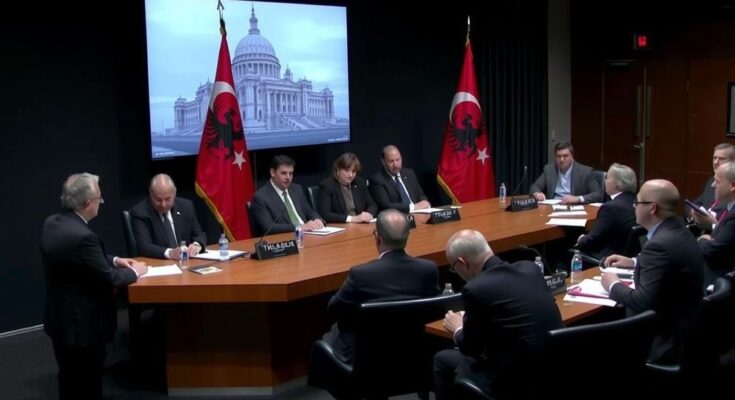At Cop29 in Baku, Albanian PM Edi Rama questioned the effectiveness of the summit if major polluters remain inactive. He emphasized the urgent need for global leaders to unite for meaningful climate action as carbon emissions rise. UN Secretary-General Guterres and other leaders echoed calls for substantial climate finance commitments, urging wealthier nations to deliver on their pledges and support vulnerable states in their fight against climate change.
During the ongoing Cop29 summit in Baku, Edi Rama, the Prime Minister of Albania, expressed deep concern regarding the efficacy of the gathering, questioning its relevance if the world’s major polluters maintain their status quo. He left his prepared remarks on climate action after witnessing leaders engage in more social activities than substantive discussions, likening the situation to everyday life where significant speeches do not lead to meaningful change. Emphasizing the alarming rise in carbon emissions since the previous conference, Rama’s comments reflect a broader sentiment of urgency among global leaders for decisive and united action against climate change. Amidst these discussions, UN Secretary-General Antonio Guterres emphasized the plight of climate-vulnerable nations and the need for wealthy countries to fulfill their financial commitments to combat climate change. Calls for a loss and damage fund, as well as structural reform of international financial institutions to support these vulnerable nations, have been reiterated by multiple leaders, citing the need for urgent adaptation and mitigation efforts. In parallel, Gaston Browne, the Prime Minister of Antigua and Barbuda, demanded immediate action from wealthy nations to deliver on a crucial trillion-dollar climate finance package, insisting that these measures cannot be mere pledges but must reflect moral and legal obligations. The collective call for more robust climate finance highlights the recognition that true climate justice requires grants rather than loans, to avoid exacerbating the debt burdens of developing nations. Furthermore, the summit has seen commitments from various nations, including the establishment of a high ambition coalition advocating for immediate climate action aligned with the goals of limiting global temperature rise to 1.5 degrees Celsius. The messages from various leaders underscore a crucial consensus; the time for mere dialogue has passed, and the world must embrace tangible actions to avert a climate disaster. In view of the recent statistics indicating an ongoing increase in emissions from fossil fuels, the urgency for transformative change is more pressing than ever. The global leaders are being urged to finalize commitments that reflect both the stark realities of climate change and the historical responsibilities of major polluting nations to ensure a sustainable future.
The Cop29 summit serves as a pivotal platform where global leaders convene to address the escalating climate crisis, which is marked by increasing carbon emissions and worsening impacts of climate change. The discussions and commitments made during these summits are critical, particularly as they relate to financial pledges from developed nations to support climate initiatives in vulnerable regions. International leaders are faced with the challenge of translating dialogue into sustainable action, especially given the rising urgency highlighted by various reports detailing the devastating consequences of inaction.
In conclusion, the discussions at Cop29 reflect a critical juncture in the global response to the climate crisis. With leaders such as Edi Rama and Gaston Browne demanding accountability and action from wealthier nations, the emphasis on financial commitments and tangible outcomes resounds throughout the summit. Acknowledging the rising emissions and the urgency highlighted by UN officials, it is evident that the world stands at a crossroads, necessitating a transition from rhetoric to practical solutions in combatting climate change.
Original Source: www.theguardian.com




